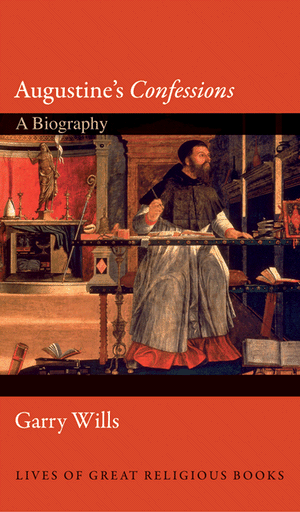 Excerpted from Augustine’s Confessions: A Biography, published by Princeton University Press © 2011. Posted by permission. Come to the launch of Princeton University Press’s “Lives of Great Religious Books” series on Thursday, March 24, in New York City, hosted by the Institute for Public Knowledge at NYU and the SSRC Program on Religion and the Public Sphere.—ed.
Excerpted from Augustine’s Confessions: A Biography, published by Princeton University Press © 2011. Posted by permission. Come to the launch of Princeton University Press’s “Lives of Great Religious Books” series on Thursday, March 24, in New York City, hosted by the Institute for Public Knowledge at NYU and the SSRC Program on Religion and the Public Sphere.—ed.
* * *
Confessions re-emerged into floodlit attention in the Romantic era of the late eighteenth and early nineteenth century, when it was read as a Bildungsroman riding on the popularity of Jean-Jacques Rousseau’s Confessions (1782) and Johann Wolfgang von Goethe’s Sorrows of Werther (1774) and Wilhelm Meister’s Apprenticeship (1795). In 1888 Harnack would compare Confessions to Goethe’s Faust. The coming-of-age tale and sins-of-my-youth story made Augustine a byword for libertine-rake glamorization. Such is the reputation of Confessions that James O’Donnell said he first took up the book as a boy with the expectation that it had salacious things in it (for which, he added, he is still futilely searching). The “great sinner” myth has no basis in fact. As we have seen, Augustine had no time for promiscuity, since he took up instantly, at age seventeen or eighteen, with his common-law wife “and lived with this one woman and kept faith with her bed” for fifteen years, all through what is supposed to be his inflammable youth (4.2). When she was sent off as he prepared for marriage, he took up briefly—for just a matter of months, or even weeks—with an interim mistress. Those are the only two women he seems to have slept with.
This is hardly the stuff of great-sinner drama, yet Augustine is popularly known as a young sex hound. His own words play to this conception, since like all saints (even virginal ones, like Therese of Lisieux) he stresses the great distance of his own lowliness from God’s purity. Even those who grant that he was not a promiscuous offender say that he was obsessed with sex. The record does not support this, either. Peter Brown points out that he does not dwell on sexual sins in his hundreds of sermons and letters, or such massive works as The Trinity or The City of God. “In a standard edition [of The City of God], out of sixteen lines devoted to deliberate human sins, only two refer to sexuality.”
He struggled to achieve celibacy, as did Jerome and other saints of his time; but he did not, as many people assume, think that sex was a matter of guilt in the unfallen state of Adam. The long argument on sex arose from his late struggle with Julian, who denied the effects of original sin. Augustine said that loss of control over one’s bodily responses was one effect of Adam’s fall—not only the problem of unwanted sexual temptation but of unwanted failure to perform sexually.
At times, without intention, the body stirs on its own, insistent. At other times, it leaves a straining lover in the lurch, and while desire sizzles in the imagination, it is frozen in the flesh; so that, strange to say, even when procreation is not at issue, just self-indulgence, desire cannot even rally to desire’s help—the force that normally wrestles against nature’s control is pitted against itself, and an aroused imagination gets no reciprocal arousal from the flesh.
The Romantic response to Confessions brought some derision from critics. Nietzsche, for instance, thought the long self-accusation over the pear theft bathetic: “Such tear-jerking phoniness.” He had the same reaction to Augustine’s lament over his friend’s death in Book 4. “How psychologically phony—for example, when he relates the death of a friend with whom he made up one soul, and decided to live on, since this way his friend would not be entirely dead. What revolting pretentiousness.”
The Romantic Kierkegaard, on the other hand, had an Augustinian sense of cosmic drama played out within the soul (Harnack’s comparison of Confessions with Faust is relevant here). And the Romantic reaction to Augustine was still strong enough for William James, in his 1902 Gifford Lectures, to present him as a “classic sick soul,” with a “divided mind,” who needed to be “twice born.”












